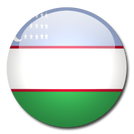International Headteacher
Menu
|
Population: 27.8 million (UN, 2010)
Capital: Tashkent Area: 447,400 sq km (172,700 sq miles) Major language: Uzbek, Russian, Tajik Major religion: Islam Life expectancy: 66 years (men), 72 years (women) (UN) Monetary unit: 1 Uzbek som = 100 tiyins Main exports: Cotton, gold, natural gas, mineral fertilizers, ferrous metals, textiles, motor vehicles GNI per capita: US $1,280 (World Bank, 2010) Internet domain: .uz International dialling code: +998 |
|
Since its independence from the Soviet Union in 1991, Uzbekistan has tried a number of different ways to stimulate the economy, including persistence with the Soviet-style command economy, adoption of strict currency controls and even slight isolationism.
Due to these failing economic measures, foreign investment in the nation has fallen dramatically. However, Uzbekistan still maintains a $113 billion gross domestic product thanks to its mining, hydrocarbon and cotton industries, which have produced some foreign investment. However if you plan on having a successful business venture, then you need to adhere to the countries own particular business etiquette and customs. Communication Uzbek is the official language of the land and three-quarters of the population speaks it. Due in part to its ubiquitous Russian population, less than one-fifth speaks Russian. The remaining population speaks Tajik. Despite the fact that their communicative abilities are indirect and can be confusing to foreigners – discussions have a lot of causal meanings – people tend to ask several questions regarding one's family, marriage, children and health immediately, which do not have to be answered but it's just considered polite to ask. Uzbeks are close talkers and stand nearer than an arm's length during conversations – more space is allocated between men and women. People of the same genders touch each other a lot: women will touch each other's arms, while men will have their arms around each other. Uzbeks of the opposite gender spend less time around each other than those of the same sex. Also, the older generation touches a lot more than their younger counterparts. Regular eye contact can be found in conversations involving individuals of the same gender. When men and women are together or when Uzbeks are around their superiors then there is less eye contact. Dress Code Although the Uzbek society can seem quite drab to outsiders, being well-groomed and wearing neatly pressed clothing is important to Uzbeks. Men will often wear conservative suits, while women will sport both conservative and stylish clothing. Jeans, t-shirts and informal clothing for business situations is believed to be impolite and inappropriate. Greetings When gentlemen meet other men then they either shake hands or perform a forearm grip. As everyone shakes hands, it's vital to ask about one's family, health, marriage, etc. Women will often mimic this behavior, but some women will kiss each other on the cheek. Silence is usually noticed upon inter-gender meetings as men and women will just shake hands and give each other a simple nod. Professional Titles & Business Cards There are no specific protocols to follow when it comes to addressing others and giving and receiving business cards. Punctuality Being punctual and on time isn't particularly significant in Uzbekistan. In other words, you show up whenever you please. This is part of the reason why unemployment or underemployment is so high in the country (25 percent) because Uzbeks don't feel like being enslaved by time or adhering to a set schedule. This also means that a lot of Uzbeks have a vast sum of free time. Uzbekistan is an interesting place to visit because its people are still persevering even though generations have suffered through turmoil. The country does have a lot of different industries than decades ago, which is creating new business opportunities. However, as people are indifferent to time and can seem impersonal, foreign investment may continue to be minimal. |
information provided by www.bbcnews.co.uk & www.careeraddict.com

